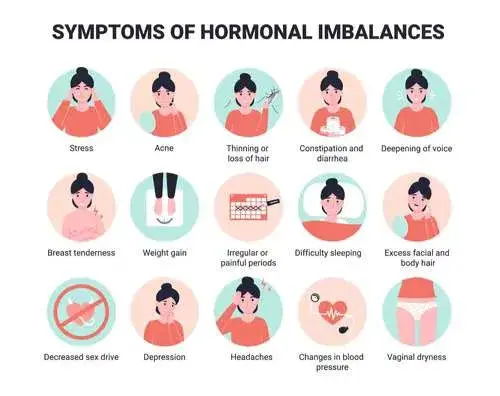Hormones greatly influence a woman's health in many different ways. Your levels of hormones will change at various times throughout your life. These changes could occur before, during, or following your periods, when you're pregnant, or even throughout menopause. In addition to the more well-known hormones progesterone and estrogen, which impact a woman's reproductive health, many additional hormones have various health-related effects on women, including their energy levels, mood, weight, and other factors. A healthy body and mind depend on hormonal equilibrium. Here, we examine hormonal imbalance symptoms in females. So, if you want to learn more about female hormone imbalance symptoms, keep reading!
"From mood swings to weight gain, hormonal havoc leaves no aspect of a woman's life untouched."
What is Hormonal Imbalance in Women?
The endocrine system includes hormones, substances produced by various glands and organs. Within the bloodstream, hormones reach all of the body's tissues and organs. They send signals to these organs, instructing them on what task to do and when. Hormones regulate numerous bodily functions. Hormones control heart rate, sexual function, body sleep cycles, temperature, overall stress levels, mood, metabolism, and appetite. Now, understand hormonal disorders in female.
What Are The Hormonal Imbalance Symptoms in Females?
Unbalanced female hormones can cause a variety of symptoms. Which glands or hormones are malfunctioning depends on the signs of a hormonal imbalance.

The following signs and symptoms are brought on by a few of the most typical harmons problem in female:
1. Weight gain
In addition to controlling metabolism, hormones also control how the body uses energy. Hypothyroidism develops when the body doesn't create enough thyroid hormone, which causes significant weight gain. Additionally, Polycystic Ovarian Syndrome (PCOS) patients have reduced insulin sensitivity. These ladies tend to put on weight since the hormone is connected to blood sugar control.
2. Problem in sleeping
One of the Female hormones imbalance symptoms is insomnia, which can make it difficult for women to get a good night's sleep. Hormonal imbalances may be to blame if you haven't slept well. In most cases, insomnia may be brought on by low levels of the ovaries' hormone progesterone. Furthermore, low estrogen levels cause excessive perspiration and night sweats, interfering with a decent night's sleep.
3. Hair fall
Most people experience daily hair loss. However, the start of losing lots of hair could indicate a health problem. Addressing the root of your hair loss rather than just the symptoms is critical. Hair loss may be caused by a lack of various hormones, including:
- Thyroid hormone: Some of the main causes of hair loss may be low thyroid function.
- Adrenal glands: Hormones produced by the adrenal glands. Cortisol is a stress-related hormone produced by the adrenals. The body enters a condition of stress as its levels grow.
- Women sex hormone:Hair loss may occur if you are going through postmenopausal or perimenopause or have a hormone-related disorder like PCOS.
Also Read: Postmenopausal Hypertension: A Cause of Concern
4. Acne
The occasional pimple may appear, especially while your menstruation is in season. But if your acne is persistent and severe, hormonal imbalances can be at blame. Excessive androgen hormone production might trigger an oil gland overload on your skin. Pores become clogged; as a result, leading to an acne outbreak. Know more about acne symptoms!
5. Irregular periods
Some women experience monthly menstruation cycles that run smoothly. Some people, though, are less fortunate. It might happen occasionally, but it should only occur occasionally, especially when there are several months between cycles. Usually, hormonal imbalance in women include irregular periods. Period irregularities are common among women between 40 and 50 approaching menopause and might be considered a typical part of the process.
Also Read: Home Remedies For Irregular Periods
6. Heavy Menstrual Bleeding
A rise in estrogen levels can cause the growth of uterine fibroids. These fibroids frequently cause much blood to flow during the menstrual cycle. Get more details about Menorrhagia (Heavy Menstrual Bleeding): Symptoms and Treatment
7. Vaginal dryness
Although a little dryness now and then is considered natural, if it happens frequently, low estrogen levels could be to blame. This type ofhormone imbalance might cause the area's wetness to decrease, which can make you feel rather uneasy.
Also Read: How To Soothe Thrush Itching? 15 Natural Remedies To Try
8. Mood swings
Hormonal abnormalities, in addition to a lack of energy, can impact how you feel. We frequently experience irritation and melancholy. Variations in estrogen levels can negatively impact the emission of molecules like dopamine and serotonin; this inhibits you from feeling cheerful.
9. Cold hands and feet
If you need a jacket in an air-conditioned space but everyone around you seems okay, you may have hypothyroidism. Hands and feet that get cold are one of the more prevalent symptoms that low thyroid hormone levels can cause. Hormonal imbalances are the core cause of a wide range of issues that women confront. The specific symptoms are frequently dismissed as unimportant inconveniences that may be tolerated because they are fairly prevalent and affect many women.
10. Decreased sex desire
Numerous elements, including physical and emotional health, previous experiences, convictions, and interpersonal connections, might impact one's desire for sex. Medication, various disorders, and physical changes can all greatly impact libido. For instance, changes in progesterone levels and health issues like diabetes or thyroid dysfunction may reduce your desire for sex.
Also Read: 4 Lifestyle Factors Affecting Women's Sex Life
11. Loss of muscular mass
The endocrine system is crucial in controlling the metabolism of muscles. Muscle growth and bulk are influenced by androgenic hormones, growth hormone, thyroid hormone, and an insulin-like growth factor. Also affecting muscle strength is the absence of several hormones:
- Muscle growth may be slowed by hyperinsulinemia and hyperglycemia.
- Low androgen and estrogen levels may impact muscle physiology caused by physiological, pathological, or medicinal treatment-related factors.
- Modifications in the metabolism of thyroid hormones can affect how muscles work.
Also Read: Maximizing Muscle Growth: How Much Protein Should You Consume?
12. Digestion problems
The microbiota in the gut is impacted by sex hormones, particularly estrogen, which changes how the GI tract functions. This may result in nausea before or during menstruation, stomach pain, bloating, constipation, or diarrhea. The effect of estrogen on the gut may also contribute to women's higher risk of developing irritable bowel syndrome than men.
13. Leakage of breast
If you are not pregnant or breastfeeding but still observe a creamy discharge from the nipples, it could result from excessive prolactin levels. This might indicate conditions involving the thyroid gland and the pituitary glands, two glands in your body, respectively.
Also Read:15 Superfoods to Increase Estrogen Levels in Females
What are the possible causes of Female Hormonal Imbalance?
However, other causes of hormone imbalances happen for other causes, like:
1. Thyroid-related problems
Thyroid hormone levels in your body become unbalanced due to a hyperactive or underactive thyroid. Tumors, autoimmune diseases, medications, and more could bring on these problems. Know more about common Symptoms of Thyroid Problems in Females.
2. Stress
Your body produces cortisol in response to stress. Cushing syndrome may end from excessive cortisol. Long-term stress subjects your body to prolonged exposure to elevated cortisol levels and may impact the availability of various hormones.
Also Read:8 Supplements and Vitamins for Stress Relief
3. Eating disorder
Your hormone levels can be impacted by eating problems, including anorexia nervosa, which can result in low estrogen levels, the poor density of bones, and other issues.
Also Read:Top 5 Super Food For Bones Health
4. Birth control
Some birth control methods contain hormones that change hormones that are in your body. They may result in difficulties, including no periods or irregular periods, severe bleeding, digestive troubles, weight gain, etc.
Conclusion
Hormones are sophisticated and potent molecules. If one or more of them is out of balance, it might induce symptoms that make you feel out of control of your body. Hormonal imbalance symptoms in females can cause a range of symptoms, including mood swings, irregular periods, fatigue, weight gain, and decreased libido. It's critical to consult your doctor if you're experiencing new or persistent symptoms. They can order certain tests to see whether the problem is due to a hormone imbalance or another issue. It is really important to take treatment once you find your symptoms.

Reviewed by







